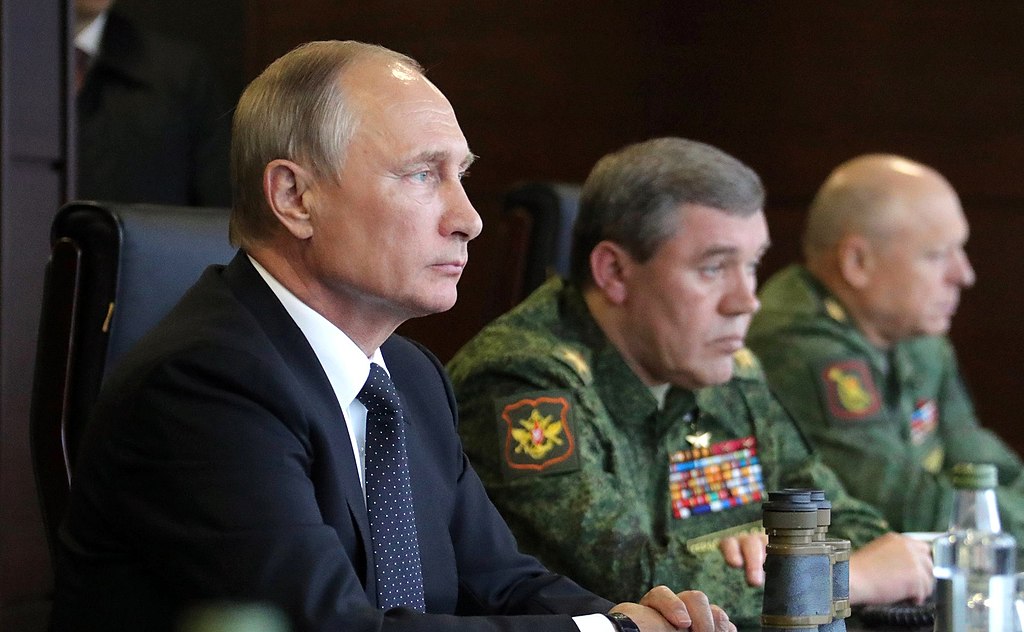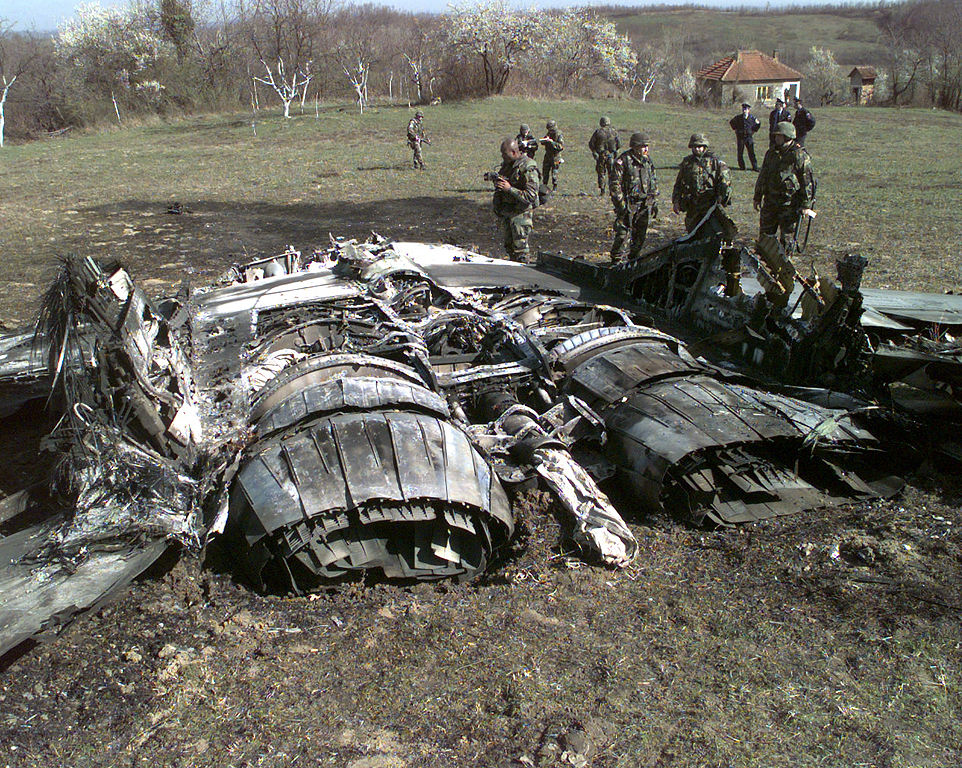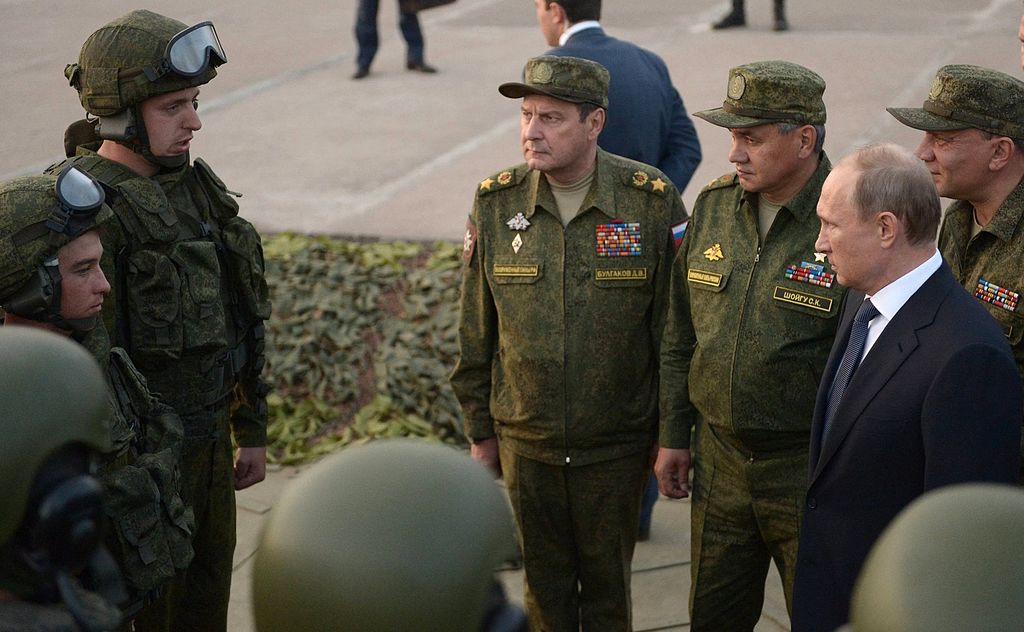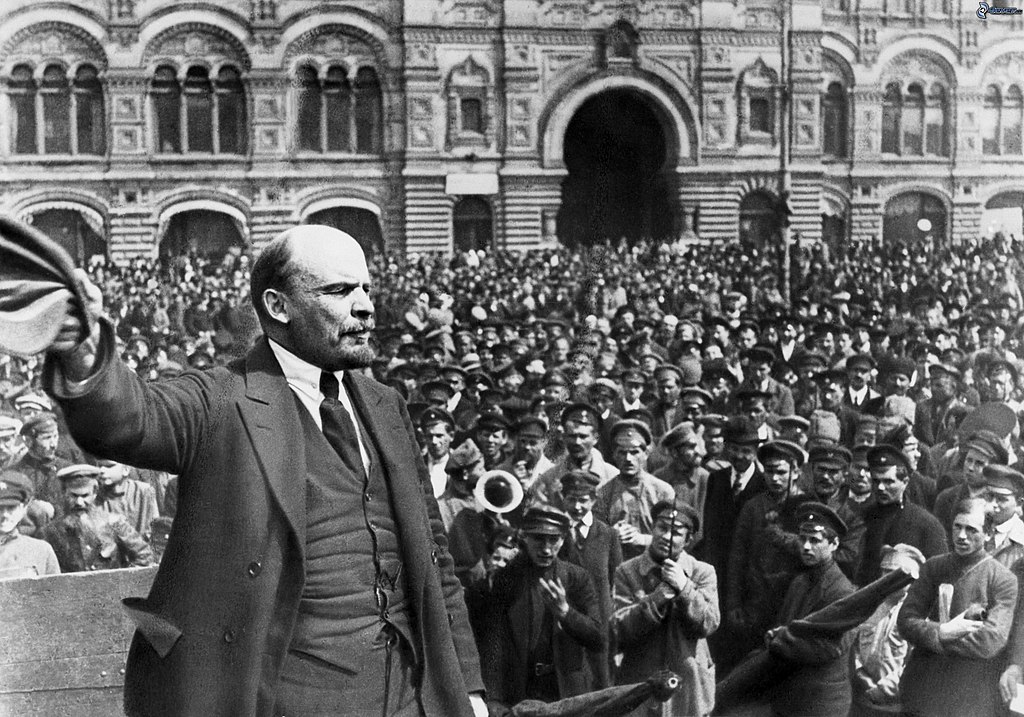
Russian President Vladimir Putin has recognised the independence of the Donetsk and Luhansk Peoples’ Republic (DPR and LPR) in South Eastern Ukraine and sent Russian “peacekeeping” troops into both territories. This represents a significant escalation of the conflict between Russia and Western imperialism. What interests lie behind the conflict, and what should be the position of the international labour movement?
The West has already announced it will respond with previously threatened economic sanctions. US imperialism, NATO, the European Union and the UK have all complained that Putin’s decisions are a “violation of Ukraine’s sovereignty” and a “flagrant disrespect for international law and norms”. This is completely hypocritical. The countries now denouncing Russia’s actions have themselves taken exactly the same kinds of measures before.
Let us not forget that it was Western imperialism that pushed for the breakup of Yugoslavia in 1992. There was no talk of ‘national sovereignty’ then, and the reason was clear: it was in their interests to break up the former Yugoslavia in order to regain old spheres of influence. It was a completely reactionary move that unleashed civil war and ethnic cleansing in the heart of Europe.
Hypocrisy
US imperialism and its European junior partners now talk about the need for Russia to respect ‘national sovereignty’, depicting themselves as upholders of democracy and human rights. Are we supposed to forget the fact that they have had no qualms in the past in bombing and invading sovereign countries? They are experts at organising military coups and generally meddling in other countries’ affairs – when it suits their interests. We have seen this from Iraq to Afghanistan, from Honduras to Venezuela, from Libya to Somalia, and a long list of others. And when it doesn’t suit their interests, they turn a blind eye. We see this in Yemen, where Saudi Arabia has been allowed to crush a whole nation and starve millions. That is because Saudi Arabia is a friend to Western imperialism, while Russia is not!
From the point of view of the interests of workers in all countries, we should not be fooled by the game that is being played about “who started it”, or who is to blame for the present conflict. There are imperialist aspirations on both sides. Ever since the collapse of the Soviet Union in 1991, US imperialism and its European NATO allies have been encroaching on what was formerly a Russian sphere of influence, gradually bringing Eastern European countries within their alliance.

Ukraine is a candidate for future membership, and it is abundantly clear to anyone with eyes to see that NATO expansion is intended to curb Russian imperialist ambitions in the region. That is to say, it is a means of limiting the Russian capitalist class, and promoting the interests of Western imperialism. Had NATO not insisted on expanding eastwards, we would not be facing the possibility of another war in Europe. But that is the same as saying: if NATO were not an alliance of capitalist powers, out to promote their own interests, we would not be in this position. Capitalism is a system that inevitably creates war at a certain point. When normal relations do not suffice, when “peaceful competition” no longer serves the interests of the national ruling classes, then war becomes the next option.
The various “colour revolutions” that we have seen in East European countries since 1989-91 were not expressions of the will of the people of these countries. Rather, they were the result of manoeuvres by the West to establish regimes that would facilitate the further dismantling of what remained of state property, gain control of the local markets, and widen its sphere of influence, while pushing back the influence of Russia. So this is not a conflict between a ‘democratic’ west and a ‘dictatorial’ Putin, but a struggle between two opposing imperialist powers for control of a region. And whenever Western imperialism acts in an aggressive manner, it always tries to put the blame on someone else, presenting itself as a force for ‘peace and democracy’.
The irony of the situation is that in carrying out this manoeuvre, Putin seems to have followed a playbook written by Washington, down to the details, such as describing the Russian troops entering the Donbas as “peacekeepers”. He seems to be mimicking the behaviour of US imperialism when it cynically used the plight of the Kosovar Albanians to bomb Serbia, a traditional ally of Russia. Now Putin is cynically using the plight of the Russian-speaking people of the Donbas to strike back at Ukraine and the West in general, while the US and European powers shed crocodile tears over the breaking of ‘international law’, a concept with no real meaning on the ground. International relations in the epoch of imperialism are not governed by law, but rather by economic and military might.
In his long speech justifying the recognition of the DPR and LPR, Putin has made clear the reactionary, chauvinistic ideology behind this intervention. He talked about Ukraine being an artificial nation carved out of Russia’s body by Lenin and the Bolsheviks. “Modern Ukraine was completely created by Russia, or to be more exact, by Bolshevik Communist Russia,“ he said. “Lenin and his supporters did it in a crude way, alienating Russia’s historical territories. Millions of people living there weren’t asked at all.” He added that “now grateful descendants have demolished monuments to Lenin in Ukraine. This is what they call de-communistisation. Do you want de-communistisation? Well, this quite suits us. But you must not stop halfway. We are ready to show you what genuine de-communistisation means for Ukraine.” In this he was making clear that his model is that of Imperial Russia. And in so doing, he is questioning the very existence of Ukraine, which he considers “Lenin’s creation”.
It is abundantly clear that Putin’s moves are not motivated by the plight of ethnic Russians in Ukraine, nor the people of the Donbas, but rather by the interests of the Russian capitalist class, who are eager to reassert the role of Russia as a power. Putin’s escalation reflects the national security interests of capitalist Russia: an aggressive and reactionary power with regional imperialist ambitions, which we have seen displayed in Georgia, the Armenia-Azerbaijan conflict, Belarus and Kazakhstan, as well as its intervention in Syria. It also has to do with Putin’s need to shore up his popularity at home – which has been in decline as a consequence of the growing social problems and increasing poverty levels inside Russia.
Why has Putin done this?
Putin’s motivations and ambitions have been clearly displayed and openly stated. In his letter to NATO he demanded security guarantees for Russia in Europe. These included a guarantee that Ukraine would never join NATO, a curtailment of military exercises on the border with Russia and the non-deployment of medium-range missiles. This was a response to the eastward expansion of NATO after the collapse of Stalinism 30 years ago. At that time, Russia’s economy was shattered and US imperialism took advantage to consolidate its grip on Easter Europe. Now, Russia, sensing a relative decline of Washington’s power (particularly after its ignominious withdrawal from Afghanistan) is pushing back.
The US’s relative weakness has been revealed from the beginning of this clash. Despite all the talk about an “imminent invasion”, right from the beginning US President Joe Biden made it clear that he would not commit US troops to Ukraine. This followed the West’s inaction after Russia’s annexation of Crimea back in 2014. Putin received the message loudly and clearly: he could do what he wanted regarding Ukraine, with limited consequences, some economic sanctions, but no military retaliation.

This is therefore, fundamentally, a reactionary conflict between two powers. On the one hand US imperialism – still by far the most powerful and reactionary force on the planet – and its allies. On the other hand, we have the reactionary regional imperialist ambitions of Russia. The working class of the world have nothing to gain from supporting either side.
From the beginning, Putin had attempted to achieve his aims by flexing Russia’s military muscle, massing troops at the border, conducting joint military exercises with Belarus, testing its missiles, etc., while at the same time attempting, with some success, to exacerbate the splits between the US and its European allies in Berlin and Paris. It is worth noting that, in his latest move he gave advanced warning to French President Emmanuel Macron and German Chancellor Olaf Scholz, but not to Biden.
He had insisted all along that he wanted negotiations, on his terms, and for the West to put pressure on Ukrainian President Volodymyr Zelensky to implement the Minsk agreements, negotiated in 2014 and 2015. Regarding Ukraine, this would have been his preferred outcome. The Minsk agreements provide for the Donetsk and Luhansk Peoples’ Republics to remain part of Ukraine, while having a special autonomous status. This would have given Putin permanent leverage inside the country. He might have also calculated that if Zelensky were to agree to these terms (which Poroshenko had signed when his offensive against the Donbas collapsed), he would have been met with the rage of the far right nationalists and their military battalions, perhaps even bringing down his government.
Incidentally, this shows that, for Putin, the Peoples’ Republics are just so much small change that he is prepared to sacrifice in order to achieve his aims. Let us not forget that the uprising in the Donbas in 2014 was part of a larger movement, in response to the coming to power in Ukraine of a government backed by neo-Nazi paramilitary organisations and promoting a particularly reactionary brand of Ukrainian nationalism, which was deeply anti-Russian and claimed the tradition of WWII Nazi collaborators.
At that time, all sorts of elements coalesced in the two eastern republics, from some who openly declared themselves as Communists, to those whose identity was modeled by the Soviet resistance against the Nazis, to some openly reactionary Great Russian chauvinists with nostalgia for the Russian Empire.
Over a period of time, however, the Republics became completely dependent on Moscow, economically as well as militarily, their leading personnel purged of the more independent and plebeian elements. When requested to do so by Putin, the leaders of the two republics decreed the evacuation of civilians, along with the mobilisation of all men of fighting age, and then travelled to Moscow to ask for recognition, which of course Putin respectfully conceded.
Thus, the recognition of their ‘independence’ by Russia is meaningless, as they are already completely dependent on Moscow. The only real change is that Putin has declared that they are no longer part of Ukraine.
What has changed?
In response to Putin’s demands, all along the line, the United States adopted a belligerent stance, constantly denouncing an “imminent” Russian invasion of Ukraine and refusing to make any concessions to his demands. When you are the big bully in the school playground you cannot be seen as showing any weakness, otherwise everyone will feel they can challenge your position. So, while Biden was unwilling and unable to face Russia with military action over Ukraine, at the same time he could not be seen to be making concessions. It was this deadlock that led to the current escalation.
Putin clearly calculated that, despite all their fierce words, the Western imperialists are powerless to stop him. The response of the West so far has been the announcement of various levels of sanctions on Russia. The EU’s sanctions are targeted at anyone trading with the two breakaway republics. The problem of course is that all 27 EU member states have to agree, and there are clearly different opinions among them, with countries such as Italy, Austria and Germany very concerned about gas supplies. Russia supplies 40 percent of the EU’s gas consumption and across Europe there is already growing resentment and anger at the huge increase in energy bills millions of people are facing this year. The latest developments are pushing up the price of gas even further, together with that of crude oil, of which Russia is a major producer.
British Prime Minister Boris Johnson is in real need of a distraction from his own domestic problems, as his popularity plummets in the opinion polls in conditions of growing social discontent. He has been making a lot of noise about defending Ukraine and has now announced that Britain will freeze the assets of three Russian oligarchs, as well as imposing sanctions on five Russian banks.
Meanwhile, Biden has announced sanctions that would prohibit new investment, trade, and financing by US persons with the areas in Ukraine now under the control of Russian-backed separatists. But Thomas Graham, White House National Security Council’s director for Russia under George W. Bush, has stated that these sanctions “…aren’t going to have much of an impact, if at all,” on what Russia does next. They would be very similar to the sanctions imposed on Russia after it annexed Crimea in 2014, with similar impact on Putin, i.e. precious little!
Putin understands the weakness of the Ukrainian regime. But now that he has sent forces into the two republics, what will happen next? It is difficult to say what the next moves will be. War is the most complicated of equations and once it starts one cannot say what the final outcome will be. Putin will have to take stock at each turn of events and calculate his next move accordingly.
In previous articles we considered a full-blown war between Russia and Ukraine to be the least likely perspective. So what has changed? Putin was calculating that the US and the Europeans would make concessions rather than face the possibility of an extremely destabilising war in Europe. He was pushing for the Minsk agreement to be implemented. But the NATO alliance, dominated by US imperialism, as we have seen, proved incapable of stepping back and meeting Putin’s demands. In their view, any concessions now would strengthen Russia, which is precisely what they want to avoid. The United States in particular were refusing to budge on the question of NATO expansion.
This placed Putin in the position of either acting on his threats or having to climb down. His earlier threats had failed, so his only option was to up the ante and find the excuse he needed to send troops into the two breakaway republics. The advantage he has in sending forces into the two republics is that many of the people there will welcome the Russian troops. And once taken, he could use his presence in the territory to negotiate from a stronger position. If Putin were to invade the whole of Ukraine, however, it could well prove to be his undoing, for he would face a whole people that is opposed to being dominated by Russia.
No to war! The enemy is at home!
It is clear that Putin had been pushing for the West to sit at the table and make the concessions he was demanding, but the West – in particular the United States, backed by its poodles in the British government – refused. That explains why, in the end, Putin decided he had no other option but to increase the level of tension. Will he limit himself to holding on to the territories of the two breakaway republics or will he push further into the Ukraine?
Leonid Kalashnikov, head of the State Duma Committee on CIS Affairs, has pointed out that the Luhansk and Donetsk People’s Republics have been recognised as falling within the regions of the same name – the separatists only control a part of these regions. Therefore they could claim that their statehood extends to the remaining territories. Kalashnikov has stated that, “how these borders will be restored is not provided for in this agreement. What the LPR and DPR will do for this is no longer our competence.”

This clearly leaves open the option of pushing beyond the present breakaway territories, opening up the possible scenario of a direct conflict between Ukrainian and Russian forces. The West is already beginning to impose sanctions, so what else could NATO do if Putin pushes further into Ukraine to topple the present regime? From a purely military point of view, Russia could defeat Ukraine quite easily and no European power has expressed the intention of actually getting involved on the ground with their own soldiers. But whereas there is sympathy for the presence of the Russian forces among the people of the breakaway republics, it would be a very different scenario for Putin if he were to advance into the heart of Ukraine where he would meet widespread and mass opposition. This would make any territorial gains extremely difficult, and costly, to hold.
The Kyiv government will now come under enormous pressure. From its point of view, the territory of Ukraine has been formally invaded, but there is not much it can actually do. Crimea was annexed eight years ago and remains part of the Russian Federation, despite the sanctions placed on Russia. The last time Kyiv waged war in the Donbas it was defeated and no one came to its aid. Ukraine has called for an urgent meeting of the UN Security Council, but it is doubtful that this body will even issue a denunciation of Russia’s actions, seeing that Russia has the right of veto in it. Meanwhile, Zelensky’s impotence could bring his weak government down at some point.
Further underlying the relative weakness of US imperialism, its first practical response has been the removal of all remaining State Department personnel from Ukraine and the shifting of its Ukraine embassy, which had already been relocated out of Kyiv, to Lviv… to Poland! It must have been very reassuring for Zelensky to see just how far the puppet master in Washington is prepared to defend Ukraine from Russian aggression.
What is clear is that Putin’s aim, ultimately remains the same: for Russia to be recognised as a regional power and to be given guarantees that its “near abroad” will not represent a threat to its interests. It is unlikely that he will give up the territory of the Donetsk and Luhansk Republics now that he has moved in, but he could go further. This is an ongoing situation that will have to be followed closely.
From the point of view of the working class of Ukraine and Russia, nothing has been solved and nothing has been gained. When Putin said that Ukraine was Lenin’s creation, he was not correct, of course, as Ukraine’s complex national identity existed before 1917. But it was Lenin’s careful policy on national self-determination – a question over which he clashed with Stalin – that allowed for the union of Soviet Ukraine with Soviet Russia on an equal voluntary basis, as was recognised in the setting up of the USSR in 1922, exactly 100 years ago. Only in that sense, could you say that Ukraine, with its present borders, was created by Lenin, and it has now been destroyed by reactionary Ukrainian nationalists who came to power after the Euromaidan.
The working people of Ukraine and of Russia are linked by strong historical bonds, although these have been weakened by the poison of reactionary Ukrainian nationalism and Great Russian chauvinism, particularly since 2014. The country is mired in civil war, and millions have been forced to emigrate because of the economic crisis.
The only way forward for the working class is the overthrow of the parasitical capitalist oligarchy, which has ruled the country as its private fiefdom for the last 30 years, and the expropriation of its wealth. Only on the basis of the workers coming to power can Ukraine really be free, and the working class united across language and national identity barriers on a voluntary basis.
The main duty of workers in the West is to oppose our own reactionary imperialist ruling classes, who are stoking the flames of conflict. The main task of the workers in Russia is to oppose their own reactionary ruling class, which is driving Putin’s regional power ambitions. The main duty of the workers of Ukraine is to oppose their own capitalist oligarchy, which has plunged the country into civil conflict, while stashing their ill-gotten wealth abroad.
War on the palaces, peace on the huts!

